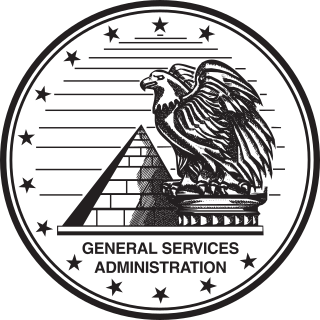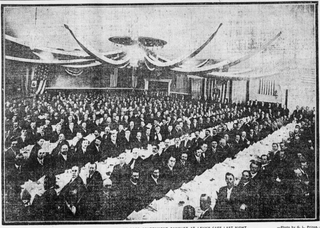
The General Services Administration (GSA) is an independent agency of the United States government established in 1949 to help manage and support the basic functioning of federal agencies. GSA supplies products and communications for U.S. government offices, provides transportation and office space to federal employees, and develops government-wide cost-minimizing policies and other management tasks.
Catherine "Cathy" Bertini is an American public servant. She is the 2003 World Food Prize Laureate. She was the Executive Director of the United Nations World Food Program from 1992 to 2002. She served as the UN Under-Secretary for Management from 2003 to 2005. Currently she is a distinguished fellow at the Chicago Council on Global Affairs, the Chair of the Board of the Global Alliance for Improved Nutrition (GAIN) and the Chair of the Executive Board of the Crop Trust.

The National Academy of Public Administration is an academic institution that was founded by James E. Webb, then-administrator of NASA, and other leading public administration practitioners in 1967 and chartered under Title 36 of the United States Code in 1984 under Pub. L. 98–257. The academy is a nonprofit, nonpartisan organization focused on analyzing emerging trends in governance and public administration. It is one of the two organizations chartered by Congress in this manner. Though the academy's funding comes primarily from studies that are congressionally requested or mandated, it is not considered a government agency. It is based in Washington, D.C. The group established the Louis Brownlow Book Award in 1968.
Founded in 2001, the American Council on Renewable Energy (ACORE) is a member-based, 501(c)(3) national non-profit organization that unites finance, policy and technology to accelerate the transition to a renewable energy economy.
The Joint Ocean Commission Initiative is a bipartisan, collaborative group in the United States that aims to "accelerate the pace of change that results in meaningful ocean policy reform." The Joint Initiative was established by the members of two major U.S.-based oceans commissions: the Pew Oceans Commission and the United States Commission on Ocean Policy. It was originally co-chaired by former White House Chief of Staff Leon Panetta and former Chief of Naval Operations Admiral James D. Watkins, chairs of the Pew and U.S. Ocean Commissions, respectively. Currently, the Joint Initiative is led by a Leadership Council, which is co-chaired by Christine Todd Whitman, former EPA Administrator under President George W. Bush and former governor of New Jersey, and Norman Y. Mineta, Secretary of Commerce under President Bill Clinton and Secretary of Transportation under President George W. Bush.
The Project on National Security Reform (PNSR) was a nonpartisan non-profit organization mandated by the United States Congress to recommend improvements to the U.S. national security system. Advocates of reform of the U.S. national security system contend that the fundamental components of the system, which includes the National Security Council, the Department of Defense, the Department of State, the Central Intelligence Agency, among others, were largely designed via the National Security Act of 1947 in order to combat the Soviet Union. Today's global security environment, largely due to globalization, is much more complex than it was during the Cold War. PNSR argues that government structures need to be more agile and efficient in order to combat new threats such as terrorism, transnational crime, and rogue states.
In the United States, a presidential transition is the process during which the president-elect of the United States prepares to take over the administration of the federal government of the United States from the incumbent president. Though planning for transition by a non-incumbent candidate can start at any time before a presidential election and in the days following, the transition formally starts when the General Services Administration (GSA) declares an “apparent winner” of the election, thereby releasing the funds appropriated by Congress for the transition, and continues until inauguration day, when the president-elect takes the oath of office, at which point the powers, immunities, and responsibilities of the presidency are legally transferred to the new president.

The IBM Center for The Business of Government is an independent business think tank that focuses on management issues in the U.S. Federal government. Founded in 2002, the Center is located in Washington, D.C.

The United States has a history of citizen, nonprofit, and other non-partisan groups advocating good government that reaches back to the late-19th-century municipal-level Progressive Movement and the development of governmental professional associations in the early part of the 20th century, such as the American Public Human Services Association and the International City/County Management Association. Many of these groups had their genesis at the Public Administration Center at 1313 East 60th Street, at the University of Chicago.
Richard Morgan Downey is an American obesity advocate, consultant and editor of the Downey Obesity Report. Downey is the former executive director of the American Obesity Association and has been actively involved in the obesity field for since 1998. He organized the first conference on obesity as a public policy issue in 1999, and has testified before Congressional Committees. In addition, he has approximately 20 professional publications and has been featured in the New York Times, the Washington Post and the Wall Street Journal, and interviewed on The Today Show and NPR.

The U.S. Global Leadership Coalition (USGLC) is a nonprofit organization formed by a coalition of American businesses and NGOs, senior national security and foreign policy experts, faith-based and community leaders from across the United States who promote increased support for the United States’ diplomatic and development efforts among both politicians and the public.
The President's Management Advisory Board is or was a council of 17 corporate executives from leading American companies. Its purpose was to provide the administration of the executive branch advice and recommendations on effective strategies for the implementation of the best business practices on matters related to federal government's management and operations, with focus on productivity, the implementation of innovative methods, customer service, and technology. The board will be chaired by former Sirius/XM Satellite Radio Director Jeffrey Zients as part of the General Services Administration of the Executive Office. On March 10, 2011, board appointees were announced, including Greg Brown, president and chief executive officer of Motorola Solutions, Inc.; Sam Gilliland, Chairman and CEO of Sabre Holdings; Debra L. Lee, Chairman and CEO of BET Networks; Shantanu Narayen, president and CEO of Adobe Systems, Inc.; and Tim Solso, Chairman and CEO of Cummins, Inc.

The Arctic policy of the United States is the foreign policy of the United States in regard to the Arctic region. In addition, the United States' domestic policy toward Alaska is part of its Arctic policy.
Pamela B. Gilbert is an American lawyer and has been a partner of the law firm Cuneo Gilbert & LaDuca, LLP since 2003, where she heads the firm's lobbying practice. Gilbert is a noted consumer rights advocate who has testified before Congress over fifty times and made dozens of appearances in the national print and electronic media. Gilbert leads the Committee to Support Antitrust laws (COSAL), an organization supportive of antitrust legislation.
The Federal Web Managers Council is an interagency group of senior federal government Web managers and new media directors who work together to improve the delivery of United States government information and services online. Established in 2004, its current mission is to provide opportunities for collaboration among U.S. government Web and new media professionals. It also recommends policies and guidelines for all U.S. federal public websites.

Shelley Hope Metzenbaum is an American nonprofit executive, academic, and former government official specializing in public sector performance management. She was the founding president of the Volcker Alliance and worked in the Office of Management and Budget during the Obama administration. Metzenbaum is a fellow of the National Academy of Public Administration.
According to the United States Office of Government Ethics, a political appointee is "any employee who is appointed by the President, the Vice President, or agency head". As of 2016, there were around 4,000 political appointment positions which an incoming administration needs to review, and fill or confirm, of which about 1,200 require Senate confirmation. The White House Presidential Personnel Office (PPO) is one of the offices most responsible for political appointees and for assessing candidates to work at or for the White House.

Planning for the presidential transition of Donald Trump, led by then vice president-elect, former governor Mike Pence of Indiana, began before Donald Trump won the United States presidential election on November 8, 2016, and became the president-elect. Trump was formally elected by the Electoral College on December 19, 2016. The transition was formerly led by Chris Christie until he and a number of his supporters were replaced or demoted on November 11. The results were certified by a joint session of Congress on January 6, 2017, and the transition ended when Trump was inaugurated at noon EST on January 20, 2017.
The U.S. Commission on Evidence-Based Policymaking was a 15-member agency in the federal government charged by the US Congress and the President with examining how government could better use its existing data to provide evidence for future government decisions.

The presidential transition of Ronald Reagan began when he won the 1980 United States presidential election, becoming the president-elect, and ended when Reagan was inaugurated at noon EST on January 20, 1981.








